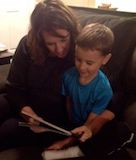By Brittany Daniels

My daughter has her own bathroom, but if she happens to be playing near Mommy’s bathroom when nature calls, that’s where she runs. Those trips to Mommy’s bathroom usually take longer simply because my bathroom is filled with fun Mommy things—jewelry, sweet-smelling lotions and soaps, and the ever-popular makeup. Needless to say, she rarely comes out looking the same way she did when she went in.
Recently, she stopped on her way to my bathroom. She came to me (doing the potty dance), and asked if I would come with her. After I asked why, she replied, “So you can make sure I don’t play in your makeup!” She was depending on me to help her do something I wanted and expected her to do independently.
Since her potty training days are behind us, I no longer want to supervise her while she’s in the bathroom. Yet she thought she needed me to monitor her to make sure she avoided the makeup. This made me think about the independence in my classroom. Do my students need me to be there in order for them to be independent? I have only my one biological child requesting my supervision in the bathroom, but in a class of 29, it’s impossible to be everywhere at once. I’d much rather be conferring while students are working independently around me, and I want to be confident that they are doing the work of literacy.
Have we set our students up to be independent? Or are we having to secretly watch from the bathroom door to make sure they’re doing what’s expected?
Are there blush-y, sparkly, shiny things that distract them from being independent? How have we explicitly taught them to focus on the task at hand?
I have found that limiting distractions and explicitly teaching the steps to independence frees teachers from having to babysit. This important work of teaching independence is a valuable skill that students will take with them forever. I mean, don’t we want our students to grow up to function independently of their teachers, administrators, supervisors, managers, and CEOs? Doing what’s expected, even when no one is watching, is just a sign of good character. Not only that, but our students’ independence means that we are free to do what we do best—teach!
We must teach for independence so we can teach for learning.
News from The Daily CAFE
 Lifelong Readers . . .
Lifelong Readers . . .
Page-Turners 5
Take a look at our summer reading stacks.
 Share Your Expertise. . .
Share Your Expertise. . .
Calling All Writers
We know you have Daily 5, CAFE, and Math Daily 3 expertise worth sharing! What are you waiting for?
 Structure Strengths. . .
Structure Strengths. . .
Cooking and Close Reading*
Recipes and close reading go hand in hand. Here's how Janice uses them for instruction.
 Summer Growth . . .
Summer Growth . . .
Family Fun Reading Letter
Here is a brief note you can share to encourage families to make reading a big part of their summer plans.
 Focus on Health . . .
Focus on Health . . .
Ability, Motivation, Attitude
Carol encourages us to use our abilities and positive attitudes to motivate others.





